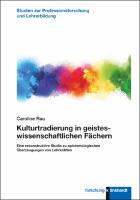Kulturtradierung in geisteswissenschaftlichen Fächern
Eine rekonstruktive Studie zu epistemologischen Überzeugungen von Lehrkräften
Abstract
This study examines the epistemological beliefs of humanities teachers. It aims to describe how they construct knowledge in the humanities and to identify associated forms of cultural transmissions. How do teachers deal with cultural manifestations such as poems or images in their teaching practice? How is their meaning elaborated? Which meanings are given? The methodology of the study is based on the qualitative-reconstructive research paradigm: The data were collected by group discussions and analysed using the documentary method. The epistemological beliefs of humanities teachers show that teacher transmit culture as high culture. They understand a cultural canon in dimension of the nation state. Teachers tend to limit the significance and the potential meaning of cultural content in school practice by introducing into a today problematic cultural essentialism. In reconstructing their epistemological beliefs, it also became obvious that these beliefs affect the reception of culture: The reproduction of traditional cultural content or its meaning is the focus. Students are denied the opportunity to influence culture(s) and, if necessary, to transform culture by cultural production. The study contributes to empirical education research, to subject didactics in the humanities and to the foundations in education. This study has opened up new perspectives on a subject that has previously been the topic of relatively little research, thus making a valuable contribution to basic research in teaching of the humanities. (DIPF/Orig.) In dieser Studie werden die epistemologischen Überzeugungen von Lehrkräften, die ein geisteswissenschaftliches Fach unterrichten, untersucht. Im Mittelpunkt stehen die Konstruktion geisteswissenschaftlicher Wissensbestände durch Lehrerinnen und Lehrer und die damit verbundenen Formen der Kulturvermittlung. Wie begegnen Lehrkräfte Kulturgütern wie beispielsweise Gedichten oder Bildern in der unterrichtlichen Handlungspraxis? Wie wird der Bedeutungsgehalt von Kulturgütern herausgearbeitet? Welche Lesarten werden vermittelt? Methodisch ist die Studie im qualitativ-rekonstruktiven Forschungsparadigma angesiedelt: Die Daten wurden mithilfe von Gruppendiskussionen erhoben und mittels Dokumentarischer Methode ausgewertet. Die epistemologischen Überzeugungen der Lehrkräfte in geisteswissenschaftlichen Fächern zeigen, dass Kultur in ihrer Ausprägung als Hochkultur an Schülerinnen und Schülern vermittelt wird. Zugleich wird ein Kulturkanon tradiert, der nationalstaatlich dimensioniert ist. Tendenziell begrenzen Lehrkräfte den Bedeutungsgehalt und das Sinnpotenzial kultureller Inhalte in der schulischen Handlungspraxis und führen Schülerinnen und Schüler damit an einen problematischen Kulturessentialismus heran. Über die Rekonstruktion der epistemologischen Überzeugungen wurde zudem deutlich, dass diese die Kulturrezeption berühren: Die Reproduktion bereits tradierter kultureller Inhalte bzw. deren Bedeutungsgehalt stehen im Mittelpunkt. Schülerinnen und Schüler bleibt es in ihrer Adressierung als Bildungssubjekte selbst verwehrt, auf Kultur(en) zurückzuwirken und diese gegebenenfalls im Kontext der Kulturproduktion zu transformieren. Die Forschungsarbeit ist im Schnittfeld der empirischen Bildungsforschung, der geisteswissenschaftlichen Fachdidaktik sowie der Allgemeinen Pädagogik verortet. Mit dieser Studie wurde ein bisher der wissenschaftlichen Forschung wenig zugängliches Thema erschlossen und somit ein wichtiger Beitrag zur Grundlagenforschung geisteswissenschaftlicher Fächer geleistet. (DIPF/Orig.)
Keywords
Lehrer; Lehrerbildung; Vorstellung <Psy>; Erkenntnistheorie; Unterricht; Geisteswissenschaftlicher Unterricht; Kulturvermittlung; Kulturelle Bildung; Fachdidaktik; Geisteswissenschaftliche Pädagogik; Gymnasium; Realschule; Unterrichtspraxis; Wissensvermittlung; Schule; Professionalität; Methode; Wissenschaftsverständnis; Gruppendiskussion; Dokumentarische Methode; Empirische Forschung; Qualitative Forschung; Studie; Bayern; Niedersachsen; Deutschland; Teacher; Teacher education; Teachers' training; Epistemology; Teaching; Humanities instruction; Cultural education; Specialized didactics; Subject didactics; Humanistic pedagogics; German academic secondary school; Grammar School; Secondary school; Intermediate school; Teaching practice; School; Professionalism; Professionality; Method; Conception of science; Group discussion; Empirical research; Qualitative research; Lower Saxony; Germany; CultureDOI
10.35468/5811ISBN
9783781523777, 9783781558113, 9783781523777Publisher
Verlag Julius KlinkhardtPublication date and place
Bad Heilbrunn, 2020Series
Studien zur Professionsforschung und Lehrerbildung,Classification
Philosophy and theory of education
History of education
Educational psychology


 Download
Download Web Shop
Web Shop